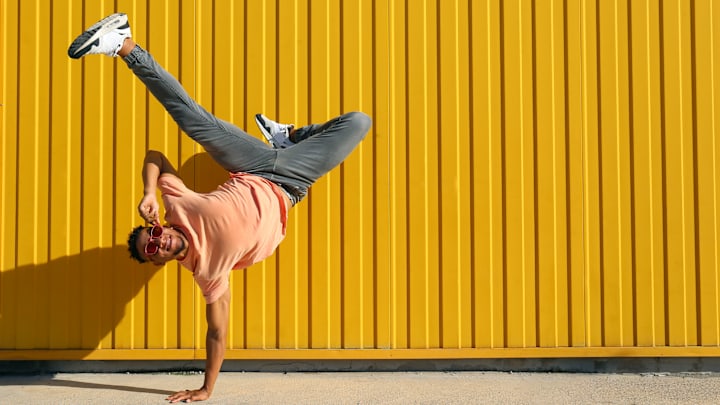Breakdancing is having a moment that few could have expected when this form of street art emerged in the 1970s as an exuberant expression of Black American and Latino culture. At the Paris Olympics in 2024, breakdancing will be an Olympic sport for the first time. To celebrate that momentous fact, which honors a great American artform and will surely make the summer games more entertaining, here are some terms from the world of breakdancing to help you sound less wack.
Breaking

Green’s Dictionary of Slang defines this shortened form of breakdancing as “a dance style perfected in New York’s South Bronx, in which dancers spin, whirl and twist, pivoting on heads, elbows, knees etc, performed to hip-hop or rap music; thus backform.” A breaker is a breakdancer, and to break means “to breakdance.” A passage from 2008’s autobiography The Adventures of Grandmaster Flash shows breaking and several other terms from the newly minted Olympic sport in action: “Popping, locking, b-boying, and baby-rocking. This wasn’t the down-on-the-ground windmills and backspins and acrobatic stuff that people imagine when they think about ‘break dancing’ today. Wasn’t called ‘break dancing’ at all. This was breakin’. This was about finding that little piece of the song where [...] you didn’t have nothing but rhythm. And then shaking your ass on it.”
B-boy and B-girl

These are terms for breakdancers, though their meaning has expanded beyond the floor to refer to anyone who is part of hip-hop culture. The first known use of b-boy is from the Village Voice in 1981: “The heroes of these legends are the ... B Boys, the Puerto Rican and black teenagers who invent and endlessly elaborate this exquisite, heady blend of dancing, acrobatics, and martial spectacle.”
Cypher and Cypher Cat

A cypher is a circle of breakdancers who take turns dancing one by one as the others watch. A breaker known for their cypher skills is a cypher b-boy, cypher b-girl, or cypher cat. Cypher (or cipher) has several older meanings that may relate to its use in breakdancing, as it can mean “a secret code” or “the concept of zero,” which is also a circle.
B-boying
A synonym for breakdancing, the term b-boying is used in David Toop’s 1984 book The Rap Attack: “B-boying was happening at the same time as DJing and rapping came out.”
Bite
In breakdancing, as in rap, biting is stealing. If someone bites your lyrics or moves, they ripped them off. But there is a lengthy history of bite having a disreputable meaning. As far back as the 1500s, bite has meant “to cheat, deceive, or steal.” The Oxford English Dictionary (OED) features a 1591 example (from Robert Greene’s The Second Part of Conny-catching) that is somewhat opaque, but involves this robbery-centric meaning: “The Priggar had smoakt the game, and perceiued he was bitten of all the bite in his bung.” Biting, in B-boying, is never considered fresh.
Freeze
This is an easy term to figure out: freeze refers to holding a pose that often requires tricky balancing during or at the end of a dance.
Pop
According to the website VolumeOne, popping is “A continuous flexing of the muscles to the beat; moves include arm waves and body waves that look like an electric current has passed through the body.” This meaning is in tune with other uses of pop, which can refer to short, sharp, explosive events.
Set

Like a stand-up comic’s prepared jokes or a band’s rehearsed songs, a breaker’s practiced moves are called a “set.”
Crashing
Things don’t always go right when breaking—even the best of breakers can crash, which is just what it sounds like: a failed attempt at a move, resulting in a breaker falling. Olympians will strive to avoid a crash at all costs.
Throwdown

The OED defines throwdown as “A performance by or contest between DJs, rappers, or similar artists. Also more generally: a contest; a confrontation.” In breakdancing, to throwdown is to hit the floor and start breaking. According to the OED, the earliest known use of the term is from a 1979 promotional flyer: “M.Y.F. presents their second annual throwdown featuring Master ‘D’.”
Call out
This is a slightly more aggressive sibling of the throwdown: specifically, it means “spontaneously [challenge] another breaker to a battle.” When you’re called out, you’d better throwdown.
This sense of call out is not unique to breaking. Similar uses of the term, meaning “demanding or requesting something from someone,” have been spotted in English since at least the 1400s. A particular sub-sense involving calling someone out for a duel dates back to 1671; according to the OED, its first use was Thomas Shadwell’s The humorists: a comedy: “Brisk. Well, ha, ha, ha, I have consider’d on’t, and Gad thou art a very honest fellow, I have that affection for thee, that the Devil take me if I fight with thee. Raym. Why did you call me out then?” A call out, then and now, is a verbal slap across the face.
Discover More Words You Might Want to Know:
